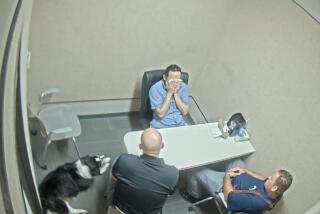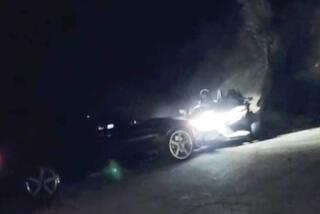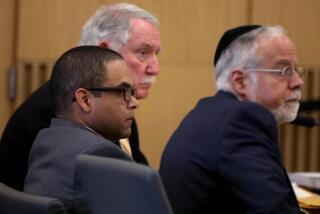Ex-Officer’s Murder Trial Opens : Prosecution Will Rely Heavily on Blood, Fiber Evidence
- Share via
SAN DIEGO — In statements opening the murder trial of fired California Highway Patrol Officer Craig Peyer, prosecutors said Tuesday they will count heavily on blood and fiber evidence that they say prove that Peyer killed university student Cara Knott in 1986.
Deputy Dist. Atty. Joseph Van Orshoven told jurors in his opening statement that fibers recovered from one of Knott’s hands match fibers from Peyer’s CHP jacket. He said investigators also found fibers on Peyer’s gun belt that match fibers from the purple sweat suit Knott was wearing the night she was killed.
At a preliminary hearing in April, prosecutors called expert witnesses who testified that blood spots lifted from Knott’s boot and sweat shirt matched Peyer’s blood type. Other experts said that a microscopic piece of gold thread found on the woman’s sweat shirt came from Peyer’s CHP jacket patch.
But while Van Orshoven said that physical evidence in the case--albeit circumstantial--will prove that Peyer killed Knott, defense attorney Robert Grimes said in his opening statement that prosecutors have failed to produce “direct evidence that (Peyer) had contact with Cara Knott.”
“The evidence will show that Miss Knott wasn’t killed until (Peyer) was back at the station,” Grimes said.
‘Glaring Errors’
Without elaborating further, Grimes said Knott was killed by as many as two people. In addition, Grimes said the prosecution’s experts committed “some glaring errors” when they analyzed the fiber evidence used against Peyer.
Peyer, a 13-year CHP veteran, is charged with strangling Knott, a 20-year-old San Diego State University student, on Dec. 27, 1986. Police said she was killed between 9 and 10 p.m. on a bridge near Interstate 15 and the Mercy Road off-ramp in San Diego. Knott’s body was thrown 65 feet off the bridge into a dry creek bed, where it was discovered by police the next morning.
Peyer, 37, who was fired by the CHP after the murder charges, is free on $1-million bail.
San Diego police homicide investigators arrested Peyer on Jan. 15, 1987, after several young women said they had been stopped by Peyer at night for minor traffic violations and forced to park at the same dark off-ramp.
Opening statements Tuesday lasted about 15 minutes for each side, and after that, 15 witnesses were questioned in less than five hours. Knott’s family and boyfriend, Wayne Bautista, testified that she was a cautious and considerate woman who always kept them informed of her whereabouts.
Called Family
On the night that she was killed, Knott called her family in El Cajon to tell them she was leaving Bautista’s Escondido house and coming home. She stopped at a gas station at 8:27 p.m. to purchase gas, and that was the last time she was seen alive. Family members testified that it normally took Knott 45 minutes to make the drive home from Escondido.
The victim’s father, Samuel Knott wept as he described the family’s desperate, all-night search for her. He said three times he tried and failed to persuade the CHP and San Diego County sheriff’s deputies to launch a search for his daughter.
But the deputies told him that Cara Knott would have to be missing for 24 hours before a missing person report could be taken, Samuel Knott said.
Also testifying Tuesday was Shirley Schwartz, an attendant at a service station, who said Peyer stopped for gasoline that night and “seemed nervous, disheveled and he had scratches on his face.”
“I remember him saying that it had been a rough night, or a tough night, something like that,” Schwartz said.
The scratches on his face were bright red and looked fresh, she said.
More to Read
Sign up for Essential California
The most important California stories and recommendations in your inbox every morning.
You may occasionally receive promotional content from the Los Angeles Times.










